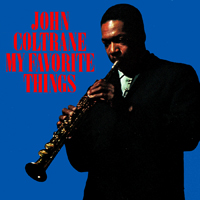Background
In March 1960, while on tour in Europe, Miles Davis purchased a soprano saxophone for Coltrane. While the instrument had been used in the early days of jazz (notably by Sidney Bechet) it had become rare by the 1950s with the exception of Steve Lacy. Intrigued by its capabilities, Coltrane began playing it at his summer club dates. [6]
After leaving the Davis band, Coltrane, for his first regular bookings at New York's Jazz Gallery in the summer of 1960, assembled the first version of the John Coltrane Quartet. The lineup settled by autumn with McCoy Tyner on piano, Steve Davis on bass, and Elvin Jones on drums. Sessions the week before Halloween at Atlantic Studios yielded the track "Village Blues" for Coltrane Jazz and the entirety of this album along with the tracks that Atlantic later assembled into Coltrane Plays the Blues (1962) and Coltrane's Sound (1964).
According to Lewis Porter's biography, Coltrane described "My Favorite Things" as "my favorite piece of all those I have recorded".
Music
The title track is a modal rendition of the Rodgers and Hammerstein song "My Favorite Things" from The Sound of Music . The melody is heard numerous times throughout, but instead of playing solos over the written chord changes, both Tyner and Coltrane take extended solos over vamps of the two tonic chords, E minor and E major (whereas the original resolves to G major), played in waltz time. In the documentary The World According to John Coltrane , narrator Ed Wheeler remarks on the impact that this song's popularity had on Coltrane's career:
In 1960, Coltrane left Miles [Davis] and formed his own quartet to further explore modal playing, freer directions, and a growing Indian influence. They transformed "My Favorite Things", the cheerful populist song from 'The Sound of Music,' into a hypnotic eastern dervish dance. The recording was a hit and became Coltrane's most requested tune—and a bridge to broad public acceptance. [11]
The album is also notable for Coltrane's arrangement of the George Gershwin standard "But Not for Me" which showcases the Coltrane changes technique, as heard on "Giant Steps" and "Countdown".
On March 3, 1998, Rhino Records reissued My Favorite Things as part of its Atlantic 50th Anniversary Jazz Gallery series. Included as bonus tracks were both sides of the "My Favorite Things" single, released as Atlantic 5012 in 1961. [13]
This page is based on this
Wikipedia article Text is available under the
CC BY-SA 4.0 license; additional terms may apply.
Images, videos and audio are available under their respective licenses.
